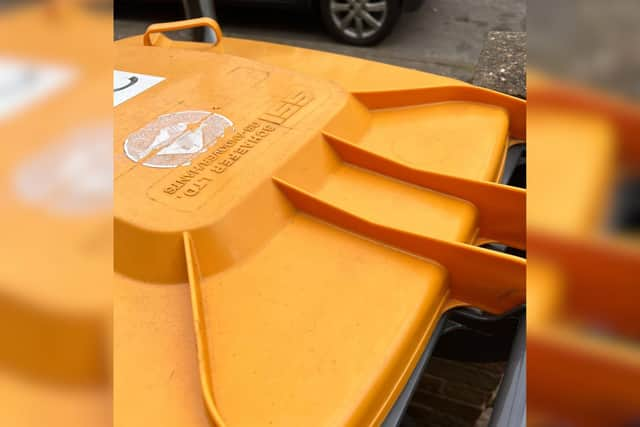Bedford people putting record amount of waste in WRONG recycling bin
and live on Freeview channel 276
A record amount of waste from Bedford households was wrongly placed in recycling bins last year, new figures show.
The Local Government Association (LGA) said households and councils have worked hard to increase the amount of waste recycled, but are held back by manufacturers using unrecyclable packaging.
Advertisement
Hide AdAdvertisement
Hide Ad

Bedford Borough Council say the five items most commonly put in the orange-lidded bin that CANNOT be recycled are:
Black bags
Food
Sanitary/nappy waste
Wood
Bags of rubbish
Rejected waste material can be turned away from recycling due to contamination by water, dirt, or chemical treatments such as preservatives or paint.
Figures from the Department for Environment Food and Rural Affairs show last year's rejects in Bedford accounted for 13.5% of the 32,956 tonnes of household waste sent for recycling.
An LGA spokesperson said households have made a "real shift" to ensure they are recycling as much as possible while councils work hard to share information on what can be recycled.
Advertisement
Hide AdAdvertisement
Hide AdThey said: “However, the manufacturers of plastic packaging products are still continuing to create and sell packaging that cannot be recycled and will be put in the recycling bin by people in good faith.
"The burden then falls on councils to not only collect it and dispose of it, but to pay the extra cost of disposing of it."
They added councils are trying to achieve net zero with “one hand tied behind their back" as manufacturers continue to produce plastic that cannot be disposed of sustainably.
A Bedford Borough Council spokesperson said: “It’s been really positive to see such an increase in the amount of waste Bedford borough residents want to recycle and we’ve been working to raise awareness of which items we can currently accept.
Advertisement
Hide AdAdvertisement
Hide Ad"A recent campaign on Facebook focused on explaining what items cannot be recycled in the orange-lidded bin and we are looking to use this and other channels to continue to help make recycling less confusing for local residents.
“The Government has stated that after the forthcoming local elections it will publish its consistent waste collection rules in England. This will set out the requirements for all councils across the country to standardise collections and will make recycling easier, increasing recycling rates.
“Once we have received this guidance, we will be able to assess as a council how we will fund and deliver any new recycling streams including weekly food waste collections.
“The five items most commonly put in the orange-lidded bin that cannot be recycled are: black bags, food, sanitary/nappy waste, wood and bags of rubbish.
Advertisement
Hide AdAdvertisement
Hide Ad"It is frustrating that manufacturers continue to use packaging that we cannot recycle."
The national increase in rejected material reported across England is also likely due to China's ban on all solid waste imports and effects of the Covid-19 pandemic.
The figures show in Bedford, 28,511 tonnes of household waste were recycled – 37% of all rubbish. It was down from a recycling rate of 40% in 2020-21.
A Defra spokesperson said it wants to recycle and reuse more waste, and support households to do so.
Advertisement
Hide AdAdvertisement
Hide AdThey said: “There was an increase in rejected material reported by local authorities in the wake of the pandemic but we have since set a suite of targets to reduce different types of waste, including plastic, glass, metal, paper and food by 2028 through our landmark Environmental Improvement Plan."
The plan aims to ban the supply of single-use plastics later this year, make some businesses pay to recycle their own packaging by 2024, and introduce a deposit return scheme for plastic and metal drinks containers in 2025.